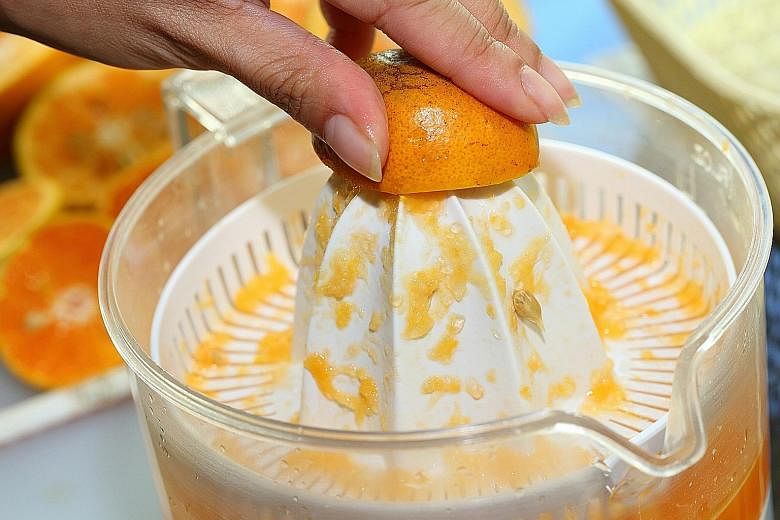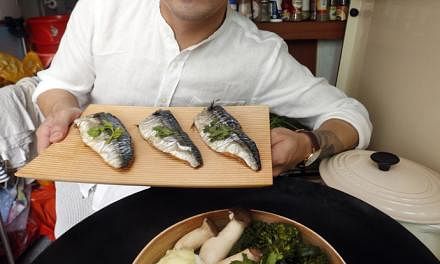Losing weight involves eating less and exercising. This can be challenging for many people, which is why fad diets are appealing.
However, quick fixes will not keep your weight down in the long run. Worse, they may even damage your health. Here, we clear the air on some commonly-held beliefs.
MYTH: Crash diets can help you lose weight
FACT: Crash diets, or very low- calorie meal plans, are unlikely to result in long-term weight loss.
In fact, they may lead to longer- term weight gain, according to the National Health Service in Britain.
"The main problem is that this type of diet is too hard to maintain," it said on its website, NHS Choices.
"You may also be missing out on essential nutrients as crash diets can be limited in the variety of food consumed."
Your body will be low on energy and may cause you to crave high-fat and high-sugar foods. This can lead to eating those foods and more calories than you need, it added.
MYTH: Gluten-free foods will help with weight loss
FACT: Such food products are generally advised for people with celiac disease or who are sensitive to gluten, a protein found in wheat, barley and rye grains.
"If you don't have these health problems but avoid gluten anyway, you may not get the vitamins, fibre and minerals you need," said the United States-based National Institute of Diabetes and Digestive and Kidney Diseases.
"A gluten-free diet is not a weight-loss diet and is not intended to help you lose weight."
MYTH:Juicing vegetables and fruit is a good way to eat healthy and can lead to weight loss
FACT: Fruit juice, with or without added sugar, is mainly fruit sugar water without fibre, said Dr Ng Lee Beng, a consultant at the department of family medicine & continuing care at Singapore General Hospital.
"Even blended fruit juice has its fibre partially broken down. It is digested more rapidly and causes higher sugar surges than real fruit."
-
WHAT IS A CALORIE?
Calories are units of energy that are used to estimate the energy value of food.
The term "kilocalorie" is often used interchangeably with "calorie". What is the difference?
One kilocalorie (kcal) is equivalent to 1,000 calories.
When people talk about food, they often use Calorie - with a capital C.
One "large" calorie is the same thing as one kcal.
However, the capital letter is often dropped for convenience, which can lead to confusion.
In some countries, nutrition labels may also state the energy value of foods in kilojoules instead.
One kcal is equivalent to approximately 4.2 kilojoules.WHAT IS THE CALORIE CONTENT OF DIFFERENT FOODS?
1g of fat: 9 kcal
1g of carbohydrates: 4 kcal
1g of protein: 4 kcal
1g of alcohol: 7 kcalWHAT IS OUR DAILY RECOMMENDED CALORIE INTAKE?
It is recommended that men consume no more than 2,200 kcal a day, and women, 1,800 kcal.
However, these numbers may vary, depending on the individual's age or lifestyle.
A person who has a sedentary office job, for example, may not need quite as much energy.
The key to weight control is to consume fibre-rich foods such as fruit and vegetables, wholegrains, wholemeal bread and noodles.
"Such foods require you to bite into them. This slows down the eating process, giving you time to register that you are full," Dr Ng said.
Food packaged with fibre also takes longer to digest and will thus stay in your stomach longer and keep you full for a longer period. You will then eat less, said Dr Ng.
It also does not cause the blood sugar highs that force the pancreas to produce excessive insulin.
"High insulin masks the sensation of feeling full, so you continue to eat," said Dr Ng.
MYTH: Lifting weights will make you "bulk up" and won't help with weight control
FACT: Lifting weights or doing other activities two or three days a week that may help you build strong muscles, such as push-ups and some types of yoga, will not bulk you up, according to the US National Institute of Diabetes and Digestive and Kidney Diseases.
"Only intense strength training, along with certain genes, can build large muscles," it said on its website. Like other kinds of physical activities, muscle-strengthening activities will help improve your health and may also help control your weight by increasing the amount of energy-burning muscle.
MYTH:Skip the carbs as they are fattening
FACT: Many people avoid bread, rice and other carbs, thinking this will help them maintain their weight. But carbohydrate-rich foods are a source of energy.
Besides, it is the calories that count and, gram for gram, carbohydrate has less than half the calories of fat, according to the British Heart Foundation.
What ups the calorie count are the sauces or toppings, such as creamy sauce on pasta.
It is about making the right choices as some carbs, especially wholegrain versions, are packed with fibre which can keep hunger at bay. For example, wholegrain pasta is more filling than white pasta and will keep you satisfied longer.
MYTH: A detox diet can help you stay healthy and lose weight
FACT: Such diets may involve eating only fruit and vegetables or a limited range of foods; or cutting out certain food categories like dairy products. They are based on the idea that toxins build up in the body and can be removed by eating - or not eating - certain things.
However, the British Dietetic Association said the idea of detoxing is nonsense.
"Our body constantly filters out, breaks down and excretes toxins and waste products like alcohol, medications, products of digestion, dead cells, chemicals from pollution and bacteria," it said.
"Unfortunately, many of the claims made by detox-diet promoters are exaggerated, not based on robust science, and any benefit is short-lived."








